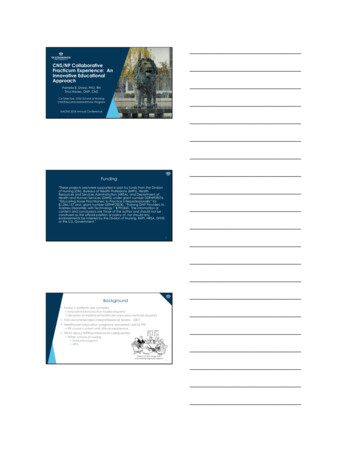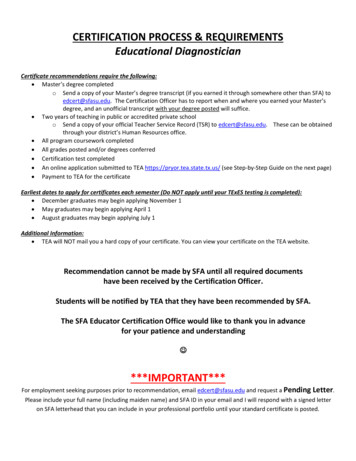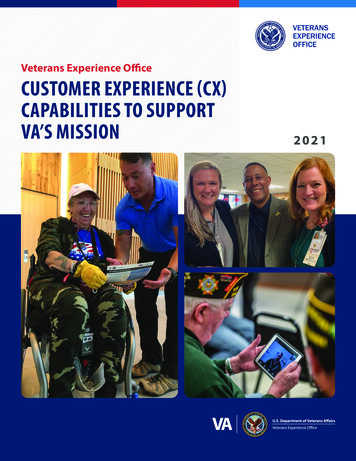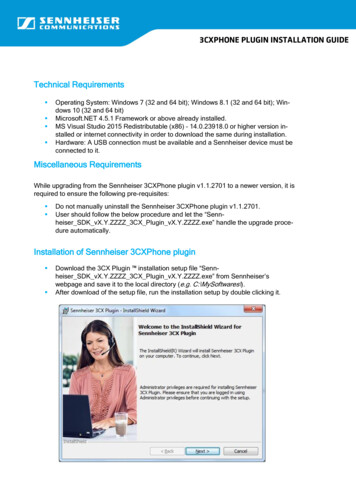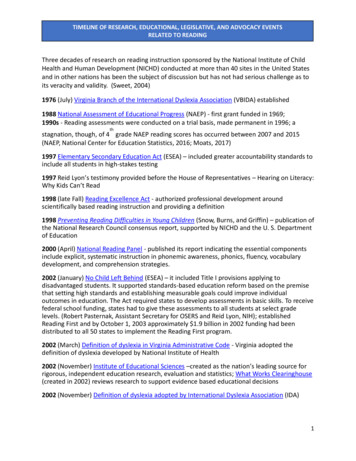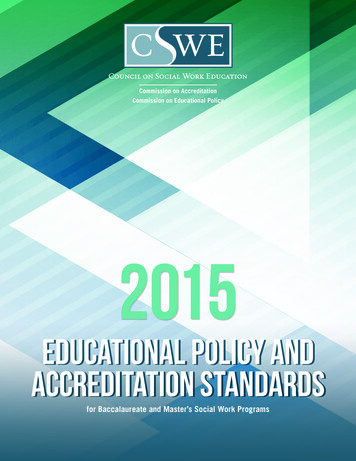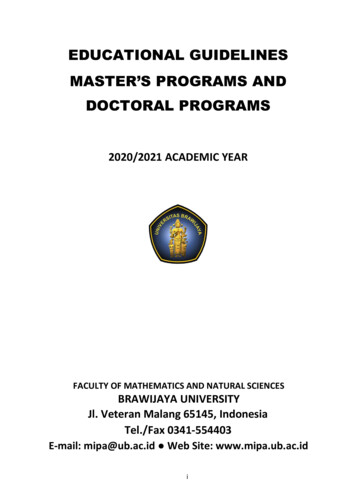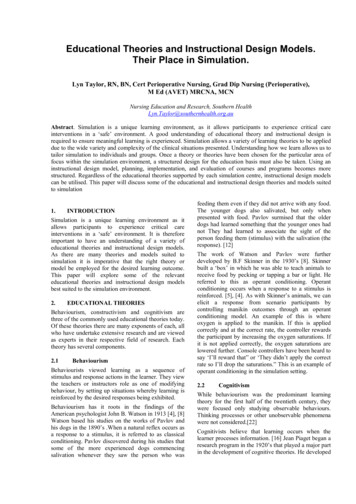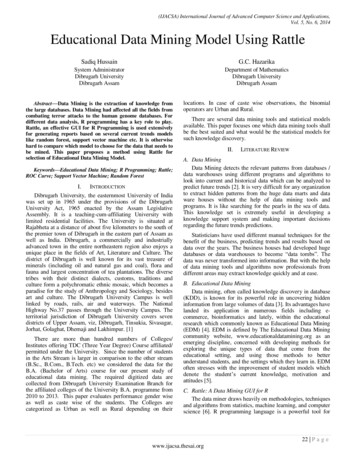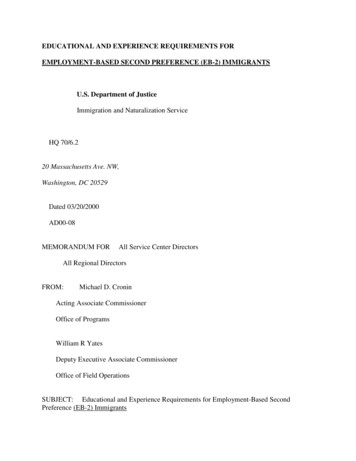
Transcription
EDUCATIONAL AND EXPERIENCE REQUIREMENTS FOREMPLOYMENT-BASED SECOND PREFERENCE (EB-2) IMMIGRANTSU.S. Department of JusticeImmigration and Naturalization ServiceHQ 70/6.220 Massachusetts Ave. NW,Washington, DC 20529Dated 03/20/2000AD00-08MEMORANDUM FORAll Service Center DirectorsAll Regional DirectorsFROM:Michael D. CroninActing Associate CommissionerOffice of ProgramsWilliam R YatesDeputy Executive Associate CommissionerOffice of Field OperationsSUBJECT: Educational and Experience Requirements for Employment-Based SecondPreference (EB-2) Immigrants
This memorandum addresses issues relating to the Adjudicator’s Field Manual , Appendix 221. Chapter 22 provides guidance on employment-based immigrant petitions. This memorandumis being released as an appendix to insure complete Service-wide dissemination. The policiesoutlined within this document will eventually be incorporated within the text of Chapter 22 ofthe Adjudicator’s Field Manual.BackgroundIn pertinent part, section 203(b)(2) of the Immigration and Nationality Act (the Act) providesimmigrant classification to members of the professions holding advanced degrees or theirequivalent and whose services are sought by an employer in the United States.Petitions seeking the classification of alien beneficiaries as EB-2 advanced degreeprofessionals present a number of issues for Service Center adjudicators. This memorandumprovides guidance regarding such decisions.What is an Advanced Degree?An advanced degree is a U.S. academic or professional degree or a foreign equivalent degreeabove the baccalaureate level.What is the Equivalent of an Advanced Degree?The equivalent of an advanced degree is either a U.S. baccalaureate or foreign equivalentdegree followed by at least five years of progressive experience in the specialty. Consequently,an alien beneficiary who does not actually hold an advanced degree may still qualify as an EB-2professional if he or she has the equivalent of an advanced degree.There are several ways in which an alien seeking EB-2 classification may satisfy theadvanced- degree requirement. The simplest is by possessing a U.S. academic or professionaldegree above the level of baccalaureate. In the alternative, the foreign equivalent of such adegree is equally acceptable.An alien with a U.S. or foreign equivalent baccalaureate degree who does not possess anadvanced degree may still meet this requirement if the baccalaureate-level degree is followed byat least five years of “progressive experience” in the specialty.
What Elements Must Be Established before an EB-2 Petition for an Advanced DegreeProfessional Can Be Approved?Two critical elements must be established before an advanced degree EB-2 petition can beapproved. First, the position itself must require a member of the professions holding an advanceddegree. Second, the alien must possess an advanced degree as shown by a master’s degree or itsequivalent. The threshold issue regarding the position itself appears to be the most troublesomein adjudicating EB-2 petitions for advanced degree professionals.The key to making this determination is found on Form ETA-750 Part A. This section of theapplication for alien labor certification, “Offer of Employment,” describes the terms andconditions of the job offered. An adjudicator must review the job requirements contained inblocks 14 and 15 of the ETA- 750 and determine whether the position requires an advanceddegree professional.Deciding whether the position requires an advanced degree professional is independent ofwhether the alien beneficiary is himself an advanced degree professional. If the job itself doesnot require an advanced degree professional, the petition must be denied, even if the alienbeneficiary actually is an advanced degree professional. Likewise, the petition must be denied ifthe alien beneficiary is not an advanced degree professional, even if the job itself requires anadvanced degree professional.Whether the alien beneficiary actually possesses the advanced degree should be demonstratedby evidence in the form of a transcript from the institution that granted the advanced degree. Anadjudicator must similarly consider the baccalaureate transcript and the alien's post-baccalaureateexperience for the alien beneficiary claiming the equivalent to an advanced degree.Does the Job To Be Filled by the Alien Beneficiary Require an Advanced Degree?A petitioner seeking classification for an EB-2 advanced degree professional must clearlydemonstrate that the position requires a member of the professions holding an advanced degree.In other words, blocks 14 and 15 of the ETA-750 must establish that the position requires anemployee with either a master’s degree or a U.S. baccalaureate or foreign equivalent degreefollowed by at least five years of progressive experience in the specialty.It should be emphasized that the mere absence of the word “progressive” from blocks 14 and 15
on the ETA-750 is not grounds for denial of the petition if the required experience is in factprogressive in nature. Adjudicators should examine the nature of the experience required for theposition as described in block 13 of the ETA-750 in order to determine whether such experienceis progressive.What exactly is Progressive Experience?“Progressive experience” is not defined by statute or regulation. Its plain meaning within thecontext of EB-2 adjudications is relatively simple: employment experience that reveals progress,moves forward, and advances toward increasingly complex or responsible duties. In short,progressive experience is demonstrated by advancing levels of responsibility and knowledge inthe specialty.Recognizing progressive experience in blocks 14 and 15 of the ETA-750, however, is not sosimple. Much of the uncertainty concerning such determinations involves petitions for highlytechnical positions, which invariably describe required experience in highly technical terms.Such descriptions may be difficult to understand for anyone outside that specific industry.Adjudicators who encounter these types of descriptions should request that petitioners provide,to the extent possible, plain-English explanations of the experience required. Such descriptionsmay take the form of a supplemental statement filed with the Service Centers indicating why fiveyears of post- baccalaureate and progressive experience would be necessary to performsuccessfully the duties set forth in highly technical job descriptions. The supplemental statementshould be an affidavit (or other statement under penalty of perjury) from some person within thepetitioning firm who has relevant knowledge concerning the minimum acceptable qualificationsfor the position involved in the Form I-140. It is incumbent upon the petitioner to describe theposition offered in such a way so that an adjudicator can reasonably determine whether the jobactually requires an advanced degree or, in the alternative, five years of post-baccalaureateexperience that is progressive in nature.It is reasonable to infer that highly technical positions are progressive in nature due to theconstant state of change in their respective industries. This is not to say, however, that five yearsof post- baccalaureate experience in a highly technical position automatically translates to anadvanced degree in every case. As with any adjudication, a petition seeking classification for anEB-2 advanced degree professional should be decided on a case-by-case basis.How can these Requirements be Demonstrated?The terms, “MA,” “ MS,” “Master’s Degree or Equivalent” and “Bachelor’s degree with five
years of progressive experience,” all equate to the educational requirements of a member of theprofessions holding an advanced degree. The threshold for granting EB-2 classification will besatisfied when any of these terms appear in block 14.It is also important to read the ETA-750 as a whole. In particular, if the education requirement inblock 14 includes an asterisk (*) or other footnote, the information included in the note must beconsidered in determining whether the educational requirement, as a whole, demonstrates that anadvanced degree or the equivalent is the minimum acceptable qualification for the position.As long as the minimum requirement for the job offered is master’s degree or the equivalent, theposition should be found to require a member of the professions holding an advanced degree.This is true even if several variations of this requirement are stated.ExamplesThe following are examples of actual statements contained at blocks 14 and 15 of the ETA-750.They are by no means exhaustive. Their inclusion here is intended to simply illustrate conceptsdiscussed in this memorandum.Position 1: Staff Software EngineerETA 750 Item 14:field.Education - B.S. (or foreign equiv.) comp. science, elec. eng., or relatedExperience – 5 years job offered or 5 years related occupation software engineer.ETA 750 Item 15: Exp. must include: design & development of major software subsystems;RDBMS internals; operating system internals; complex systems software design; symmetricmultiprocessing and large scale network systems.It is unclear whether this job requires 5 years of experience following receipt of thebaccalaureate. For this reason, the adjudicator should request that the petitioner provide asupplemental statement clarifying whether the position requires five years of post-baccalaureateexperience that is truly progressive in nature. If the supplemental statement establishes that theminimum qualifications for the position require a member of the professions holding anadvanced degree and, assuming the beneficiary possesses these qualifications, the petition shouldbe approved.
Position 2: Senior Software EngineerETA 750 Item 14:Education – MSCS or equiv.***.Major Field of Study – Computer Science or related field.Experience – 3 years in job offered or 3 years in related occupation of Software Engineer.ETA 750 Item 15: C/C Programming; RDBMS Design ***Will consider candidates withBSCS and 5 years experience as Software Engineer.Similarly, it is unclear in this position as well whether this job requires 5 years of postbaccalaureate experience as a Software Engineer. Because of the additional requirement of aMaster of Science in Computer Science degree or its equivalent, however, the underlyingpetition may be approvable. For this reason, the adjudicator should request that the petitionerprovide a supplemental statement clarifying whether the position requires five years of postbaccalaureate experience that is truly progressive in nature. If the supplemental statementestablishes that the minimum qualifications for the position require a member of the professionsholding an advanced degree and, assuming the beneficiary possesses these qualifications, thepetition should be approved.Position 3: Software EngineerETA 750 Item 14:Education – Master’s or equivalent*Major Field of Study**Experience – 3 years in job offered or in the related occupation of software engineer, systemsengineer, or programmer/analyst.ETA 750 Item 15: * Bachelor’s degree in Computer Science, Electrical Engineering oracademic equivalent, and 5 years of progressive experience will substitute for Master’s degree inComputer Science and 3 years of such experience.** Computer Science, Electrical Engineering or academic equivalent.
This position clearly requires a master’s degree or 5 years of progressive experience.Consequently, the position requires a member of the professions holding an advanced degree.Again, assuming the beneficiary possesses these qualifications, the underlying petition should beapproved.Relevance of the alien beneficiary's actual qualificationsThe second and third examples raise an additional question to be decided before approvingsome petitions -- those in which the alien beneficiary does not actually have a Master's degree.The ETA-750 in each of those cases requires that a candidate with a Master's degree must havethree years' experience, but that a baccalaureate with five years' experience is acceptable. Thequestion is whether the petitioner can include the alien's 5 years' post-baccalaureate progressiveexperience both to make the alien's baccalaureate the equivalent of a Master's degree and to meetthe three years' experience that someone who actually does have a Master's degree must have.The answer will depend on what the ETA-750 actually says. Note that the sample ETA-750s donot require that the three years' experience must follow the receipt of a Master's degree -- onlythat the applicant must have both the degree and the experience. The ETA-750, therefore, doesnot preclude someone who just received a Master's degree from qualifying for the position on thebasis of pre-Master's experience. By the same reasoning, someone with a baccalaureate degree,and experience that makes it equivalent to a Master's, can qualify based on the pre-Master'sequivalency experience. If the beneficiary has a baccalaureate with five years' progressive postbaccalaureate experience, the petition should be approved unless the ETA-750 clearly andexplicitly requires that the level of experience that a Master's applicant must have must be postmagisterial experience.If the ETA-750 does require that the experience must have been post-magisterial experience,and the alien beneficiary just has the baccalaureate plus five years' progressive postbaccalaureate, then the alien beneficiary cannot meet the post-magisterial experiencerequirement. In that case, the petition should be denied, not because the alien beneficiary is notan advance degree professional, but because the alien does not meet the actual qualifications asstated on the ETA-750. See K.R.K. Irvine, Inc., v. Landon, 699 F.2d 1006 (9th Cir. 1983); Matterof Wing's Tea House, 16 I & N Dec. 158 (INS AFM/0-0-0-1/0-0-0-26573/0-0-0-31107.html (AccessedAug. 16, 2012)
The equivalent of an advanced degree is either a U.S. baccalaureate or foreign equivalent degree followed by at least five years of progressive experience in the specialty. Consequently, an alien beneficiary who does not actually hold an advanced degree may still qualify as an EB-2 professional if he or she has the eq
